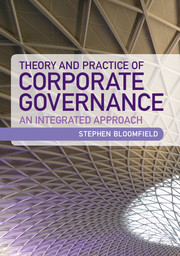Book contents
- Frontmatter
- Contents
- List of Figures and Tables
- Introduction
- Part 1 The Discipline of Governance
- Part 2 The Relationship between Law and Governance
- Part 3 Governance and the Listed Company
- Chapter 6 The development of governance – the Governance Codes
- Chapter 7 The 2007–8 financial crisis: the failure of systemic governance
- Chapter 8 Systemic governance: the Turner Review, the Walker Review and the Vickers Commission
- Part 4 Governance and Regulation
- Part 5 Counter-governance: Failures of governance and corporate failure
- Bibliography
- Index
- References
Chapter 6 - The development of governance – the Governance Codes
from Part 3 - Governance and the Listed Company
Published online by Cambridge University Press: 05 March 2013
- Frontmatter
- Contents
- List of Figures and Tables
- Introduction
- Part 1 The Discipline of Governance
- Part 2 The Relationship between Law and Governance
- Part 3 Governance and the Listed Company
- Chapter 6 The development of governance – the Governance Codes
- Chapter 7 The 2007–8 financial crisis: the failure of systemic governance
- Chapter 8 Systemic governance: the Turner Review, the Walker Review and the Vickers Commission
- Part 4 Governance and Regulation
- Part 5 Counter-governance: Failures of governance and corporate failure
- Bibliography
- Index
- References
Summary
This chapter:
reviews the origins, history and development of the UK Corporate Governance Code;
looks at the corporate governance processes in listed companies;
considers one of the key mechanisms of governance – the operation of committees of the board in listed companies;
evaluates the operation of the code, processes and committees in terms of traditionalist theories of governance and real world operations.
Introduction
The first two sections of this book dealt with the traditionalist/legalist approaches to corporate governance; offered some challenges to those interpretations by using illustrations from the real world and by examining the real role of the principal actors in the governance process. The way that the law interacts with governance has also been reviewed, in both general and specific terms, to illustrate ways in which protections to stakeholders and approaches to corporate governance have been based on specific theoretical premises, some of which do accord with real life and some of which do not.
This section of the book now deals with the corporate governance of listed companies – both internally, through the application of the protections that are supposed to be afforded stakeholders by the operation of the governance codes, and through the impact of listing itself.
Listed company governance is subject to the full weight of the UK Corporate Governance Code. This occurs through the contractual obligations which companies assume when they agree to the continuing obligations regime of the listing agreement. The State imposes additional obligations through the regulatory structure and through the operation of primary and secondary legislation. As such, listed company corporate governance might be regarded as the pinnacle of corporate governance – where the State (in its broadest sense) has recognised the significance and value of effective corporate governance in companies that are publicly traded and has put in place steps – formal or informal, through agents or directly – to bring about its implementation.
- Type
- Chapter
- Information
- Theory and Practice of Corporate GovernanceAn Integrated Approach, pp. 123 - 152Publisher: Cambridge University PressPrint publication year: 2013



